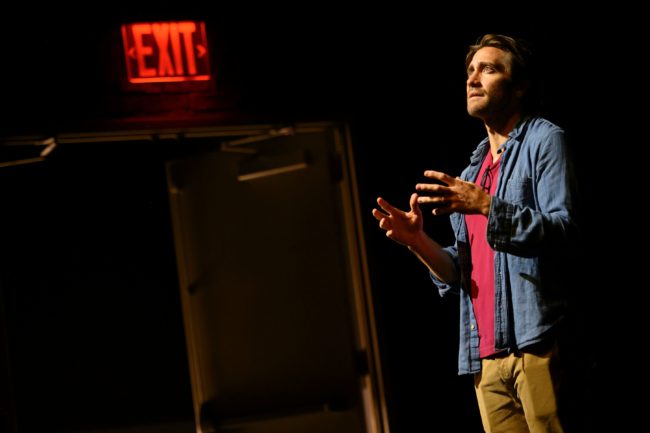Review by Elyse Trevers
It’s unusual to see gentle, sensitive men onstage, and quite frankly, they are often not dramatic and interesting. Yet once “Seawall / A Life,” a pair of monologues, begins, the audience is transfixed. lt helps that men in questions are Tom Sturridge (“1984”) and Jake Gyllenhaal (“Constellations,” “Sunday in the Park With George”) two of the finest young actors onstage today.
The two segments of the play, each about 40 minutes long, feature a loving, caring millennial dealing with love and loss. Each man is a father, son, lover and husband, who speaks directly to the audience, sometimes even awaiting a response. The two have much in common- both deal with the birth of a daughter and a relationship with a father figure. The actors stand alone on the almost – empty stage. The men acknowledge our presence, speaking directly to us. They aren’t alone; we feel like we are involved. The play is warm and intimate, despite the 970 in attendance at the Hudson Theatre. At one point during the performance I attended, someone sneezed and Gyllenhaal stopped to say “Bless you” before continuing.
In “Seawall,” the first story, Sturridge is Alex, a slender, seemingly- fragile, introspective photographer, who questions the existence of God. Alex obviously adores his wife Helen and his daughter Lucy and in discussing them shows joy and love. Much of the action of “Seawall”, written by Tony Award® winner Simon Stephens occurs at Arthur, his father-in-law’s house in the south of France. Alex shares conversations with Arthur, a man, he obviously cares for greatly. Sturridge is warm, earnest and funny, especially when he imitates him.
He verbally paints word pictures of his wife Helen, his daughter Lucy as well as Arthur. He advises, in “taking a portrait photograph, if you possibly can, take it from below the subject. It renders the subject actually oddly. What it does is it renders them not more heroic, not more god-like, oddly it renders them more human.“ Much of the beginning of the monologue is almost stream-of-consciousness with Alex jumping from subject to subject and it takes a while before he even uses the names of his family. He often stops mid-sentence, sometimes not completing thoughts. He reveals his own pains, especially in wake of devastating personal tragedies and how he lashed out at a man who is almost a father to him.
The second act, “A Life” by Olivier Award® nominee Nick Payne, morphs between two stories, basically life and death. Abe, (Gyllenhaal reuniting with Payne after having performed in his work, “Constellations” ) tells of the dying and death of his father juxtaposed with the anticipation and birth of his daughter. Although the events are years apart, the two almost sound like they are happening at the same time and the dialogue flows, seamlessly. A word or phrase like “fifteen minutes” appears in both events to signal the shift in story. At one point, the segue between the two became awkward for the audience as we laughed, assuming Abe was describing driving to the hospital with his wife in labor, only to realize it was describing his mother in the car on her way to see her dead husband.
Gyllenhaal is strong looking and tough but appears vulnerable, especially as Abe reveals his insecurities about becoming a father. Explaining that he doesn’t know how to do it, he questions how anyone would know how to fill this role. “Because the truth is I’m not a dad. I’m a son. “
Superbly directed by Carrie Cracknell, “Sea Wall / A Life” is set on a bare cold-stone brick stage, and, the actors ‘work’ the lights. The stories need no special effects: only strong stories and excellent acting. There’s a lot to identify and connect with in the play – the transitory nature of life, the nature of love, the depth of relationships and even the power of names. In theater, men often evince strength and toughness, yet what makes “Sea Wall / A Life” so powerful is in men revealing their sensitivity and vulnerability without fear of looking weak.



